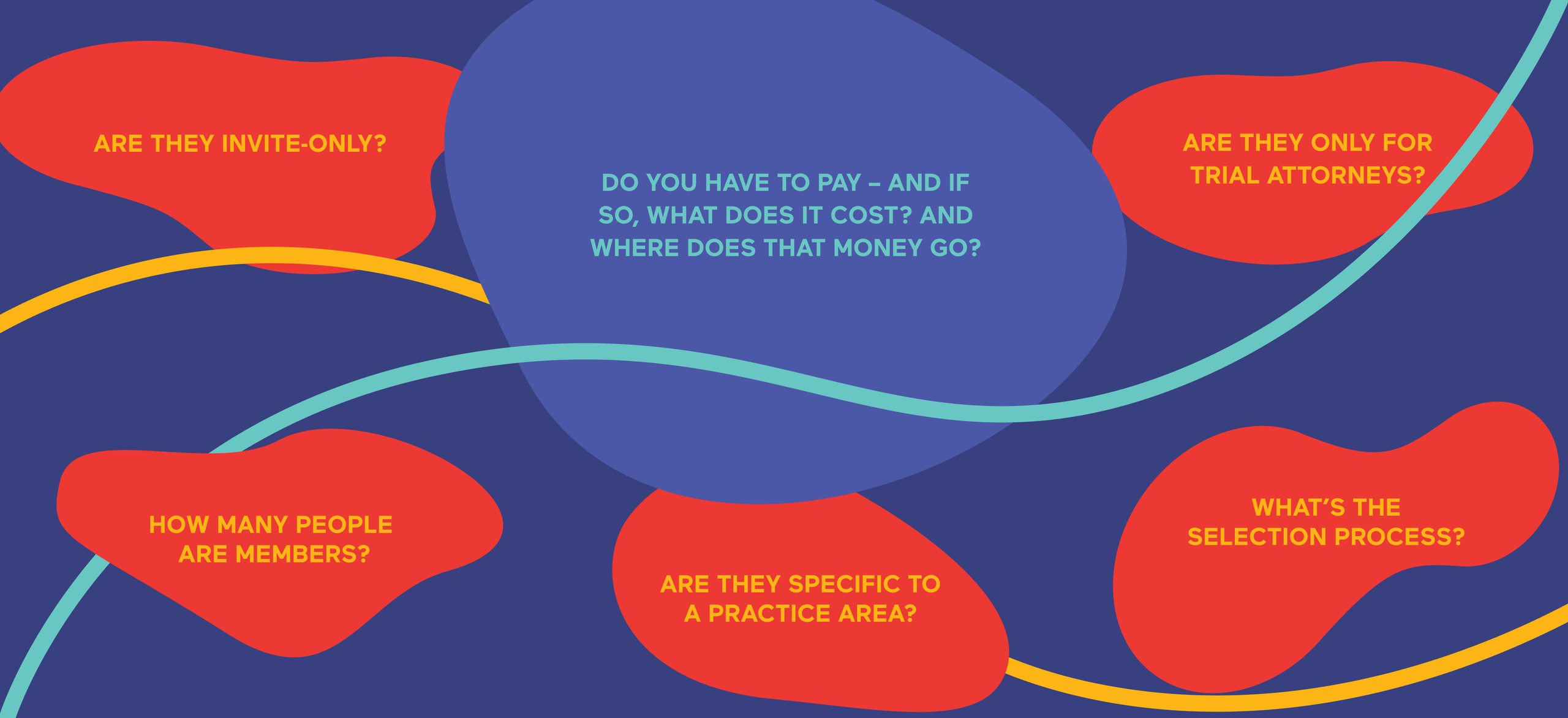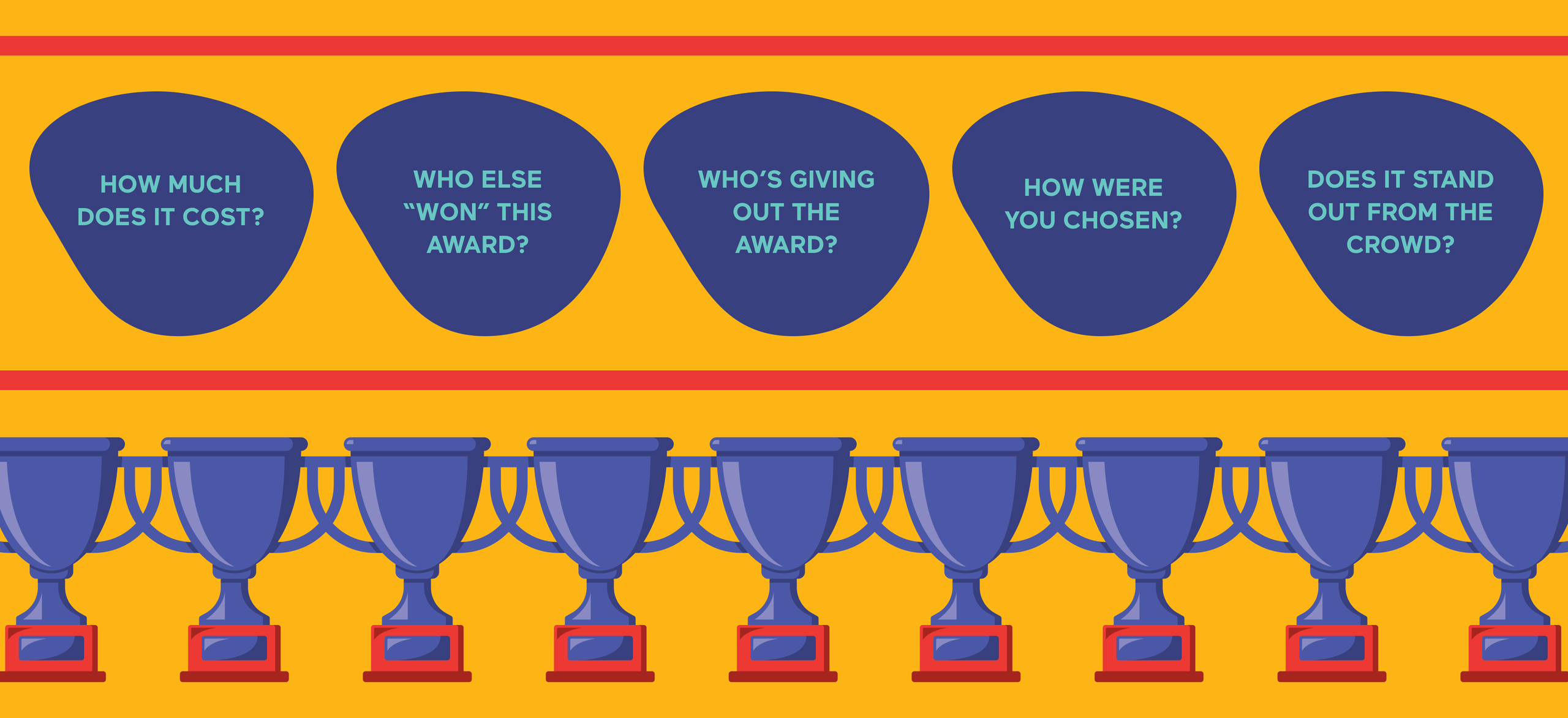If you are inundated with emails from companies or directories claiming you’ve been selected as “One of the Top 10 of 100 Best Lawyers with Expertise Who Are Also Trial Attorneys Under the Age of 40 But with 10+ Years of Experience and Extreme Client Satisfaction” – an award you can proudly display on your website for the low, low price of $750 – we hear you and we see you.
The number of law awards you can supposedly win is a lot. As such, it can be hard to know which ones hold actual value, especially because what you think is important could mean nothing to the average client.
Does it drum up business if you’re on the Super Lawyers list? Do potential clients care about an AAJ award? Conversely, are you ignoring the law awards you could actually benefit from having?

How We’re Using the Word “Award”
When we use the word “award,” we are not referring to your membership in ABOTA or your work on behalf of your local Bar Association. Sure, those come with badges and plaques, too – but they’re not the same thing.
We aren’t referring to ratings organizations or directories either, though we’ll speak more on this in a bit. (Some of those groups offer awards, yes, but they typically offer more than just a badge.)
The companies we are talking about offer you a little web code that says you’re the best of the best, or that you’re part of the top XX percent, or that you rock for client satisfaction. Those are the lawyer awards we want to talk about first.
So – Are Any of These Awards Worth Having on Your Site?
Some of them are great.
Most of them are trash.
Stop wasting your money.
But Isn’t It Helpful to Have a Lot of Awards? Don’t They Make My Firm Look Good?
Not always. Internet consumers – whether they’re looking for products or services – have a lot of options, and they want to discard as many as possible as quickly as possible with a “process of elimination” mindset. So, for the average legal consumer, that usually means narrowing firms down by their practice areas and geographic locations first.
From there, the consumer is going to look for “trust signals.”
Wait…What Are Trust Signals?
Trust signals are those visual elements that speak to a service or product’s credibility. You probably have them all over your website right now. Every time you talk about how many years you’ve been in business, how much money you’ve won for your clients, or how many staff members you have on-site who can help a client with their case, you’re providing users with your trust signals, or signs that they can trust you.
Law firm award badges can be trust signals. The problem is that there are SO many law awards out there that the power of having these badges has been inadvertently diluted. Plus, some folks understand that many of these awards are hot garbage: even the Federal Trade Commission is warning consumers to “look beyond the award” when they hire a law firm. So what was once a reliable trust signal – the badge for the award on your website – is now seen as a potential scam or, ironically, a “distrust signal.”
And here’s the thing: as an attorney, you know exactly why these badges don’t do the trick because you’ve seen the literature about law firm reviews. Too many perfect scores can actually work against your firm. It’s the same psychology here: having too many awards on your site just seems fishy.

Which Awards Are Helpful to List on a Law Firm’s Website?
The best awards rarely come with badges. The truly helpful law awards are those that a firm as a whole or its attorneys individually specifically earn for their work.
Here are some awards that are definitely worth promoting:
American Bar Association Awards
The American Bar Association (ABA) recognizes the work that attorneys, judges, advocates, and other legal professionals do both in the courtroom and outside of it, and highlighting these folks can be helpful. Why? Because it shows you care about your community, and that you are dedicated to helping others be successful.
It is a good idea to advertise these awards if you have received any of them:
- Alexander Awards – Honoring the game-changers who help students of color from their ABCs to their JDs along the legal pipeline.
- Jefferson B. Fordham Awards – Shouting out the legal pros and institutions making waves in areas of state, local, regional, and tribal government law.
- Frank E.A. Sander Awards – Celebrating the disruptors and innovators in Alternative Dispute Resolution who turn legal battles into legal breakthroughs.
- Krieger Champion of Liberty Awards – Saluting fearless defense attorneys who fight for justice and embody the best of the best in criminal defense.
- Outstanding Law Day Activity Awards – Applauding firms that bring the law to life, making the year’s Law Day theme more than just words on a page.
- Pro Bono Publico Awards – Recognizing legal champions who go above and beyond to serve those in need, appreciating that justice shouldn’t come with a price tag.
- Thurgood Marshall Awards – Honoring the relentless advocates pushing civil rights, civil liberties, and human rights to the forefront.
- Livingston Hall Juvenile Justice Award – Celebrating lawyers who dedicate their careers to fighting for kids, ensuring the next generation gets a fair shot.
- Difference Makers Awards – Spotlighting the legal heroes breaking barriers and making real change through service, advocacy, and pro bono work.
- Solo and Small Firm Awards – Cheering on the powerhouse solo and small firm attorneys who prove that you don’t have to have a big team to make a big impact.
- On The Rise – Top 40 Young Lawyers Awards – Recognizing the rising stars under 40 who are shaking up the legal world with their vision, leadership, and innovation.
- James I. Keane Awards – Rewarding law firms that are bringing legal services online and making justice more accessible for the middle class.
You can find more awards listed on the ABA’s website.
AAJ and Local Bar Awards
The ABA is not the only bar association that hands out awards. The American Association for Justice (AAJ), as well as local bar organizations, also give out awards, generally to members, to highlight the work they do. Some of these awards are for bar-specific work, and others are given to recognize things like charitable work, pro bono hours, and legislative achievements.
Each state’s Bar has its own awards, but some of the more impressive honors from the AAJ include:
- Steven J. Sharp Public Service Award – Honoring the plaintiffs and attorneys whose cases shine a light on the power and purpose of the American civil justice system.
- Leonard M. Ring Champion of Justice Award – Celebrating an AAJ® member with unwavering integrity, character, and a deep devotion to human and civil rights.
- Trial Lawyers Care Award – Recognizing a trial lawyer who doesn’t just fight for justice in the courtroom but who also, as the name implies, truly cares about their community.
- Harry Philo Award – Spotlighting champions of civil justice whose work has made America a safer place for not just their clients but for everyone.
- Leonard Weinglass In Defense of Civil Liberties Award – Applauding advocates who take bold action to defend civil rights, making a real difference in the fight for freedom.
Check out the full list of AAJ awards.
Awards or Recognition from Local Organizations
Awards from local organizations – think Kiwanis Club or your local Chamber of Commerce – are great for your brand, and they are 100% worth highlighting. The Better Business Bureau’s AAA rating is also helpful, though not technically an award.
To be fair, anything that highlights you showing up for your community, acting in good faith, or otherwise serving the greater good is helpful because it can establish a sense of camaraderie with your clients. It also shows that you’re interested in the well-being of other people, not just that of your business.
And honestly? You don’t need an award for that. Photos and videos of you out and about in the community are just as good for your brand.
TL;dr: Community outreach and participation are great for your reputation. Some companies or organizations will put your logo right on their website, which can be a pretty strong trust signal. (And backlinks are helpful for your SEO campaign, too!)

Is There Any Value in Recognition by Legal Organizations?
Of course, there is value in being recognized by a legal organization, though perhaps not in the way you think. Many prestigious organizations also recognize the work done by their members on behalf of the community. The American Board of Trial Advocates (ABOTA), the American College of Trial Lawyers (ACTL), and the National Association of Criminal Defense Lawyers (NACDL) are all reputable organizations, and the reason for this is that their awards are earned, not purchased.
But to whom are these law awards valuable? Well, for one: other attorneys. If your firm relies on referrals or if you are trying to build up your network, then highlighting your memberships in these organizations can add value here.
However, the truth is that the common folk don’t know what these groups are or what they do. Seeing a member badge – especially if there’s no explanation for why it’s important – probably won’t matter to your average consumer. To be valuable to web users, you need to explain what these groups are and what their criteria are for becoming a member:
- Are they invite-only?
- Are they only for trial attorneys?
- Are they specific to a practice area?
- How many people are members?
- What’s the selection process?
- Do you have to pay – and if so, what does it cost? And where does that money go?
It’s worth having this information on your site so your potential clients can see it. Some states (like New Jersey) require some of this information to be disclosed so that consumers understand what they’re actually looking at on a law firm’s website.
Legal Directories and Rating Services: Should You Pay to Play?
Feeling a little FOMO during “Best Lawyers Season” on social media? Wondering if that Super Lawyers 25 badge is helping you?
We understand.
The truth is that some of these awards are worth having, but again, not always for the reasons you might think. For this reason, there are only a handful of pay-to-play groups that we think are worth the money.
Martindale-Hubbell: Peer and Client Ratings
This was THE lawyer recognition that attorneys from all over sought for years. It’s been around in some form or another since 1887, and it still packs a punch for two reasons: 1) its original awards were based on peer reviews, and 2) those designations were based on ethical and trustworthy behavior. Unlike other rating services, which, despite outlining their process, are vague when it comes to attorney rankings, Martindale-Hubbell tells you upfront what they are looking for.
The chief benefit? You pay literally nothing – nothing for the rankings, nothing for the badges, and nothing for a basic profile. Martindale-Hubbell may no longer be the crown jewel in the eyes of consumers, but it still punches above its weight with your fellow attorneys.
Super Lawyers
A lot of lawyers have deep-seated feelings about Super Lawyers:

We, for one, like it because of its directory. When you search for a lawyer online, Super Lawyers often pops up as one of the first organic search results. We know most web users don’t like to scroll for too long, so being listed in their directory may help.
We also like Super Lawyers because:
- You don’t have to pay to be nominated (nor to win), so it costs our clients nothing to be listed. You can advertise with them, but you don’t have to.
- Their awards are based solely on peer nominations, which builds trust value because you can’t buy your way onto their list.
- Annual inclusion is not guaranteed.
- Your profile is free.
Best Lawyers and Best Law Firms
Best Lawyers costs money, but we believe that’s money worth spending. Here’s why:
- Americans know and trust U.S. News & World Report for their rankings on colleges and other academic institutions – so why shouldn’t they be trusted for lawyers or law firms too?
- Like Super Lawyers, this is a peer-evaluated list, so you can’t buy your way onto it.
- Content people love Best Lawyers because it means we can use the word “best” on your website without running afoul of your state bar’s rules.
The only drawback is that if you want a public profile – and that nifty little badge – you have to pay. It’s $200 for unlimited access to their platform, which is honestly a good price for a public listing in their directory.
Lawdragon 500 Leading Lawyers
This one isn’t as well-known, but we believe there’s real value to the Lawdragon 500 list. It costs $500 for their badge, but you can be listed with them for free, and with their 500-attorney limit, if you make it onto the list, you can officially claim bragging rights. (If you think 500 attorneys sounds like a lot, know that there are 187,656 licensed attorneys in New York alone.)
So, to recap, Lawdragon 500 offers:
- The prestige element of being in the top 500.
- A free directory that will list you even if you don’t pay for the badge.
- Multiple “Lawyer Limelights” per week, so you could get additional exposure from these profile pieces.
The National Trial Lawyers: Top 100 (Top 40, etc.)
This is another pay-to-play organization, but you get some nice perks:
- There’s a directory.
- The badge is cool-looking.
- There’s a small fee for your profile ($150), but that profile links back to your website, so you get a little SEO boost with it.
- Once again, your Content team will enjoy saying you’re the “Top XX” lawyer without fear of repercussions.
But what we really like about this one is the networking capabilities. Unlike other ratings services, NTL hosts several events and summits every year, each of which offers CLE opportunities. Those events have separate fees, but they’re worth paying for firms looking to increase their referral network.
Million Dollar Advocates Forum/Multi-Million Dollar Advocates Forum
This particular “award” is an interesting outlier because it gives you nothing. There’s also a one-time fee of $1,500, which is a lot of money…for nothing.
They do say you win big awards – and for some folks, that’s important.
We typically don’t recommend spending this money because we can highlight our clients’ results right on their websites, which is inarguably more effective. HOWEVER, our clients have reported that their clients are impressed by this award, so it’s really up to you.
The Rest of Them
Don’t bother – they’re scams.
A Wall Street Journal piece in 2017 said there were more than 1,200 lawyer rankings and awards out there, and if our inboxes are any indication, that number has not decreased. We’re sure some legitimate awards are out there and flying under the radar – but if they’re so far under the radar that neither clients nor attorneys care much about them, then they’re not worth your money.
An Honor or a Scam? How to Know if Your “Award” Is a Dud
So you’ve been told you’ve won an “award,” but you’re not sure whether it’s worth the fee to buy the badge or upgrade your profile. It’s tough, we know. Here’s what we ask our clients when they ask us about this:
- How much does it cost? And more importantly, what does that cost cover? If the cost includes a badge you can display, and you still retain the honor regardless of whether or not you pay, then it’s up to you whether you want to spend the money.
- Who else “won” this award? Ask around to see if anyone you know has ever won the award. Look it up online, and check out the organization’s disclaimers. Find out how many times a year it’s given out, and to whom.
- Who’s giving out the award? It’s safe to say that if your local paper is honoring you, then that’s a real award. But if you don’t recognize the name of the group that contacted you, you should do some research. You don’t want to accept an award only to find out that the group’s values aren’t aligned with yours.
- How were you chosen? Check to see what the parameters are; maybe you were nominated by someone in your community (or your office) without knowing it. If the process seems sketchy, it might be more indicative of a pay-to-play.
- Does it stand out from the crowd? Rankings and ratings are everywhere, so an award for something more offbeat, like the awards given out at Legal Food Frenzy competitions held each year at food banks across the country, can really pop.
Legal consumers are expecting to see awards on your site, but that doesn’t mean you should just accept everything that is offered to you. Too many awards can make it look like you’re just paying for a reputation, but too few may leave folks wondering why every other firm has them but you. You want to be as judicious with this as you are with everything else.
Work with the Team at MeanPug to Ensure You’re Promoting the Right Awards on Your Website
At MeanPug Digital, we help our clients highlight their achievements in a way that’s meaningful to both them and potential clients. If you’re ready to work with a team that has your best interests at heart, reach out to us today.








